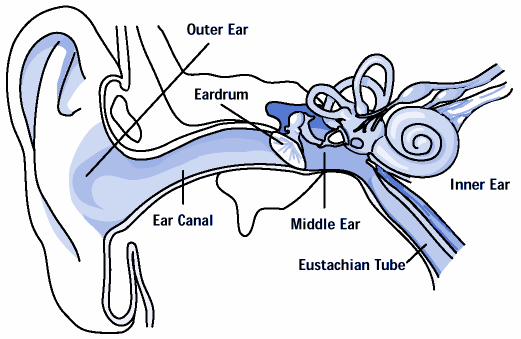Ear Infections in
Children
Main
Article page |
Beauty articles
|
Health page |
Computers|
Diseases |
Education |
Entertainment |
Family
Business |Fitness|
Fruits and Vegetables
|
Jobs |
General |
Personality|
Technology
|
Tourism |
Useful Tips
General Knowledge |
Biography Page|
Heroes & Incredible peoples
|
Inventions
Health Page|
Diseases and Remedies |
Articles|
List of diseases

An ear infection is one of the
most frequent reasons parents take a child to see a doctor. This
brochure will help you understand this disease and the treatment methods
that may be suggested by your child?s doctor or health caregiver.
What is acute Otitis media?
Acute otitis media is the
medical term for the common ear infection. Otitis refers to an ear
infection and media means middle. So, acute otitis media is an infection
of the middle ear, which is located behind the eardrum.
There is a tube, called the Eustachian
tube, that connects the middle ear to the nose. This tube helps drain
extra fluid from the middle ear. When a child has a cold, swelling in
the nose may impede drainage. Germs (either viruses or bacteria) can
enter the middle ear and cause an infection. The infection results in
increased fluid in the ear and can cause pain, fever and irritability.
When should a parent suspect ear
infection?
A parent should suspect
an ear infection when a child becomes ill with fever, is irritable, and
usually complains of pain in the ear. Many children who develop ear
infections will first have colds. However, ear pain can be caused by
other problems, such as a sore throat, without an ear infection.
How is ear infection
diagnosed ?
An ear infection should
not be diagnosed over the telephone. A doctor or other health caregiver
should examine the child. Usually, the child should be seen within 24
hours. However, an emergency room visit is not necessary unless ordered
by your health caregiver. While waiting for the office visit, you can
give the child a non-aspirin pain reliever, such as ACETAMINOPHEN or
IBUPROFEN, to control the pain.
During the examination, your child?s
health caregiver will take a brief history and carefully examine the
ear, checking the appearance and movement of the eardrum.
How is an ear infection treated?
Until recently, all
children with ear infections were given antibiotics. New research
suggests that many children with ear infections will get better without
antibiotics, and with no ill effects. This is called the ?observation
option.? This option reduces the use of unnecessary antibiotics, and
limits the child?s exposure to the side effects of antibiotics. It also
reduces the chance that ?super bacteria? ? bacteria that cannot be
killed by antibiotics ? will develop.
Your child?s health caregiver may offer
this option if your child is over age 2, does not have pus draining from
the ear, has not had an ear infection in more than three months, is
otherwise healthy, and will have medical follow-up within 48 hours. If
your health caregiver does not discuss it, you may want to ask if this
is an option for your child.
A child who is seen in an emergency room
or urgent care center may be given an antibiotic if the health caregiver
is concerned that the child will not see his or her own health caregiver
within 48 hours.
It is important that you allow the
caregiver to decide if the observation option will be used. If, on the
other hand, antibiotics are needed, you should trust him or her to
select the proper medication and course of treatment. A parent should
not insist on choosing the antibiotic.
If an antibiotic is prescribed, it will
likely be AMOXICILLIN, unless the child is allergic to penicillin.
Depending on the situation, the provider may decide that the child
should take the antibiotic for five days instead of the usual 10 days.
This should be the decision of the health caregiver. If the treatment
doesn?t work, more antibiotics may be needed.
Of course, differences in children, and
the severity of the illness, may change these choices.
Remember, a single dose of an antibiotic
will not make the ear infection feel better! In fact, the antibiotic
will not relieve the symptoms. Ear pain from an infection should be
treated with a non-aspirin pain reliever.
Even if your child appears better, make
sure that your child takes all the antibiotics prescribed by your health
caregiver.
Is follow-up necessary?
If the child is better in
48 hours with either treatment option, the health caregiver may choose
not to see the child again for two to four weeks. If, however, the
symptoms are not resolved in 48 hours, the child should be re-examined.
Can ear infections be
prevented?
Ear infections are very
common in children. But there are things parents can do to reduce the
number of ear infections their children may have.
Ear infections are not contagious or
spread from one person to another, but the colds that result in ear
infections are. Colds are spread when germs are released from the nose
or mouth during coughing or sneezing. Anything that can reduce the
spread of germs will help reduce ear infections.
Because most ear infections occur in
children under the age of three, parents can play an active role in
preventing them:
- Have children use
disposable tissues when they blow their noses or to cover their
mouths when they cough.
- Teach children
that tissues should be used only once and then thrown away properly.
- Do not allow
children to share toys that they put in their mouths.
- Wash dirty toys in
hot, soapy water before allowing other children to play with them.
- Teach children to
always wash their hands after sneezing or coughing into them.
- Do not allow sick
children to share food or drinks.
- Regularly wash and
disinfect all surface areas and common play areas.
- Do not share
bathroom cups and other utensils that go in the mouth.
You should also remeber:
- Breastfeeding
appears to lower an infant?s risk of ear infections.
- Children under age
two should not lie flat when they bottle-feed.
- No one should be
allowed to smoke around children. Secondhand smoke increases a
child?s risk for ear infections. In fact, even smoke from wood
stoves can irritate breathing and increase the risk of an ear
infection.
- Children in day
care centers tend to have more colds and a higher risk of ear
infection. Although it would be best to keep an ill child at home,
this may not be possible. Parents should work with day care center
staff to ensure proper handwashing, tissue use and cleanliness.
If, despite your best efforts, you think
that your child has an ear infection, make sure that he or she is
examined by a doctor or health caregiver. And, if there is an infection,
be sure to follow the recommended treatment approaches. Always contact
your child?s doctor or health caregiver first!



